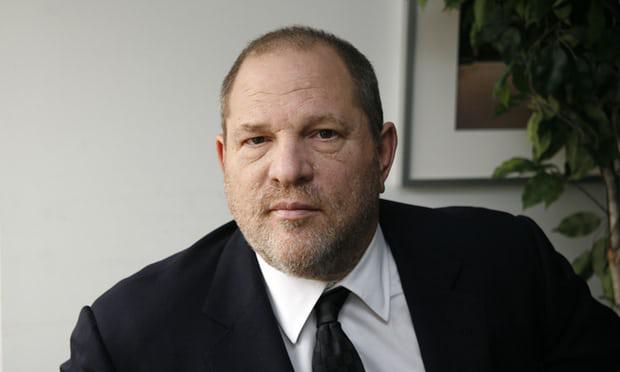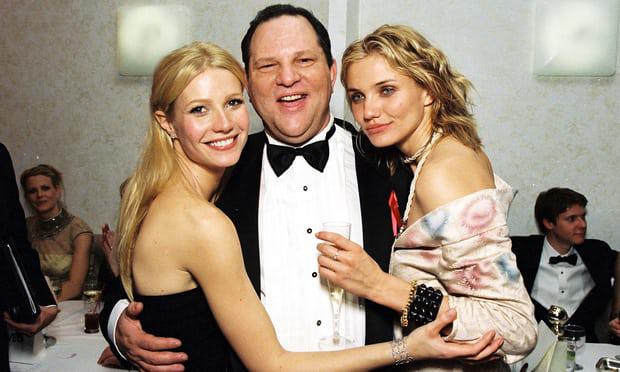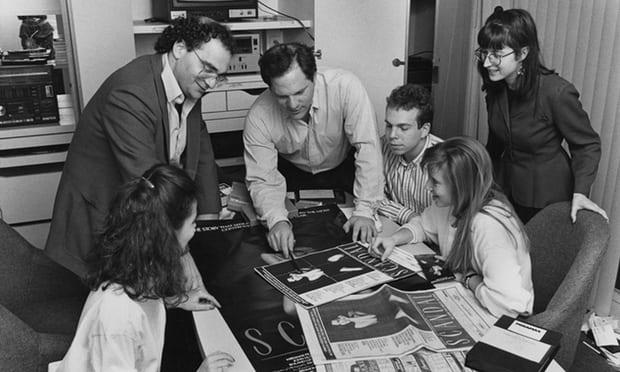|
'Pack of hyenas': how Harvey Weinstein's power fuelled a culture of enablers
By Rory Carroll And Sam Levin
It was Harvey Weinstein’s most ambitious production. A storyline stretching over 20 years with a rotating cast of actors, multiple locations across the US and Europe, a disciplined crew of assistants, producers and fixers, savvy dealmaking, and a publicity machine like no other. But this was not The English Patient, Pulp Fiction, Shakespeare in Love, The King’s Speech or any other of his films that earned more than 300 Oscar nominations. It was a shadow production, an inverted version of Hollywood that leveraged entertainment industry might into an alleged spree of sexual harassment and assaults, including rape, and into a methodical way of hushing it all up with payments, threats and non-disclosure agreements. Facilitators included colleagues and associates who set up meetings under false pretences and teams of lawyers and publicists who suppressed complaints. It was a system of abuse involving some of the most famous people on the planet, in which success was measured not in awards or fame or box office revenue, but in silence. Weinstein, 65, clenched his films in a tight grip but lost control of his shadow production when the New York Times published accounts of harassment and assault, prompting a cascade of other reports that led to Weinstein tumbling into disgrace, joblessness and possibly jail. Police in London and New York have opened investigations. Weinstein has made an apology in vague terms for his behaviour but denies any accusations of non-consensual sex. He is a pariah – fired by his company, dumped by his wife, denounced by a roll call of stars and top politicians who used to defer to him for jobs and donations. A vertiginous fall. But attention is shifting to those who were complicit, turned a blind eye, might have known or should have known – the assistants, producers, fixers, executives, publicists and lawyers who surrounded the co-founder of Miramax and the Weinstein Company. “We’re all used to predators working alone, but when they band up like a pack of hyenas, that’s a whole other ballgame,” said Zoë Brock, a model and writer who accused Weinstein of making unwanted sexual advances. “There are enablers all over the place,” said Jeff Herman, an attorney who represents sex abuse victims and is investigating options for some of Weinstein’s alleged victims. Predators’ companies often facilitated abusive encounters masquerading as work meetings, he said. “Sending limousines to pick up the victim, making flight arrangements. These guys aren’t making their own plans, making reservations.” Other industry figures agreed, saying that transactions conducted amid sunshine, palm trees and dazzling smiles often concealed darker agendas. The French actor Florence Darel told Le Parisien that she had repeatedly resisted calls to see Weinstein alone on different occasions but that her agent had insisted she must meet him. “Why do agents send women actors to predators?” she said. “Why are we supposed to go to meet producers in hotel rooms?” Sex abuse in Hollywood required wider complicity than abuse in the Catholic church, said Lorien Haynes, a Los Angeles-based writer who worked on An Open Secret, a documentary about abuse of underage boys. “It’s even a little more insidious with Hollywood because men and women are involved.” Peter Biskind, the author of Down and Dirty Pictures: Miramax, Sundance and the Rise of Independent Film, a 2004 book chronicling Weinstein’s rise in the 1990s, said facilitators ensured the alleged sexual abuse ran smoothly. “It does seem that way. They refined their technique.” Employees at Miramax put up with Weinstein’s methods and intimidation – he kept a baseball bat in his office – because the company made great films and gilded CVs, he said. “Most people there were ambivalent and made a deal with the devil for what they could get out of it. Not to justify it, but they were only human. Anybody is a potential enabler if they work in that industry.” In an essay last year titled Why the Assholes Are Winning, Jeffrey Pfeffer, a Stanford professor, wrote that proximity to power and wealth could lead to moral rationalisation and moral decoupling. “Great success and performance create their own reality,” he said. Weinstein was for many years Hollywood’s King Midas, a producer and dealmaker who nurtured talents including Quentin Tarantino and turned quirky low-budget films such as The Crying Game into major hits. He turned pitches into films and marketed the hell out of them, wooing the media and Academy Award voters with charm, bluster and guile. “Everybody has everything to gain by staying in his good graces: actors, writers, creative people – he is the conduit,” said Paul Feig, the director of Bridesmaids. “He is the gatekeeper to getting projects made, getting your face on screen, to you getting an Oscar.” When someone with such power abuses it, people “just mum up”, said the director. He said he had not heard the stories of sexual misconduct until they burst into the open last week with accounts from Ashley Judd, Rose McGowan and other female actors. Hollywood has a long tradition of casting couch abuses dating from the silent era and through the golden age, snagging the likes of Judy Garland and Marilyn Monroe. Roman Polanksi and Woody Allen are still revered despite, respectively, a rape conviction and sex abuse allegations. The brazenness shocked Haynes, a Brit, when she first moved to LA. A studio head was among those who propositioned her, she said. “I just said, ‘You’re married, does your wife know about this?’. He put the phone down when I said no. People do the most amazing things for power and money, and make the most amazing compromises. “People think there is an untouchable element.” In Weinstein’s case there was a panoply of people who wittingly or not facilitated his modus operandi of inviting a young woman – usually an actor or model – to a hotel room or private office on the pretext of discussing her career, then allegedly demanding a massage or sex. The New Yorker quoted three women who accused him of rape, an accusation the producer has vehemently denied. The article also cited 16 former and current executives and assistants at Weinstein’s companies who said they had witnessed or had knowledge of unwanted sexual advances. One former assistant, who gave her name only as Karen, told ITV the atmosphere in the office made it hard for anyone to speak out. “I think Harvey is a multifaceted person. I think he is exceptionally bright and intelligent, I think a lot of people were in awe of him.” Michael Reiss, 47, who said he briefly worked as a marketing assistant at Miramax in the 90s, recalled a culture in which junior and senior employees feared Weinstein. “Fear was the driving force, but at the same time they were such a prestigious organisation, especially after Pulp Fiction. No one wanted to buck the system. Some people were planning their escape, but tried to stay long enough to have something on their résumé. The culture of silence back then was not just for people to preserve their jobs. It was presumed that these people, these movie star producers, could just do whatever they wanted.” Weinstein cultivated journalists who ran glowing pieces about favoured actors – and negative pieces about those who angered or defied him. Even so, at least eight women made complaints, according to the New York Times. None became a public scandal. The plaintiffs accepted payment and settled out of court, bound to secrecy – a typical outcome, said Haynes, in sex abuse cases. “Lawyers encourage people to come forward and then settle. There’s a whole industry about making money off plaintiffs.” The Weinstein company board knew of at least three confidential settlements, according to David Boies, a lawyer who represented the co-founder. There was no sanction. Nevertheless, rumours seeped out. “Congratulations,” the comedian Seth MacFarlane told five best actress Oscar nominees in 2013. “You five ladies no longer have to pretend to be attracted to Harvey Weinstein.” Emily Best, an LA-based film producer, said women have shared information privately in various networks about potential abusers: “It’s a ‘whisper circle’. We have to do that. The law doesn’t protect us. The culture doesn’t protect us. So we have to protect ourselves. People will come out and say, ‘I had this experience. Nobody work with this person.” Industry analysts say the Weinstein Company’s ebbing success in recent years – the stream of hits became a trickle – made its co-founder vulnerable. So did the eruption of rape allegations against Bill Cosby and Donald Trump’s “grab them by the pussy” recording. “You can’t turn a blind eye to this shit. It’s 2017,” said Feig, the director. “We are liberal Hollywood. We’ve got to stand up to it no matter who is doing it.” He was unsure if Weinstein’s career was over. “Who knows? I thought Mel Gibson would never work again [after his antisemitic outburst in 2006].” Some are convinced this is a watershed – that Weinstein’s fall was so sudden and so steep it will rattle other offenders. Biskind, one of Hollywood’s leading chroniclers, is not so sure. “The shock value of what’s happened to Harvey will reverberate for some time. But as long as you have men, money and power it will come back. Maybe come back in a more guarded way but it’s not gone forever.”
|
.
Any original material on these pages is copyright © BishopAccountability.org 2004. Reproduce freely with attribution.


